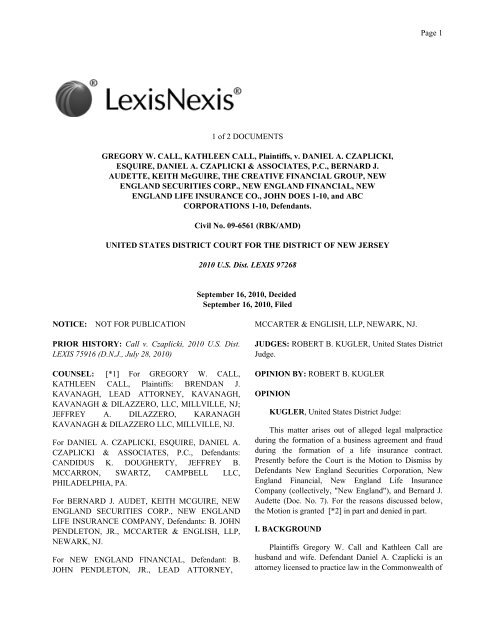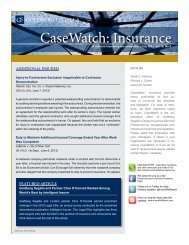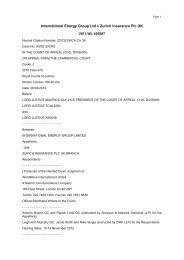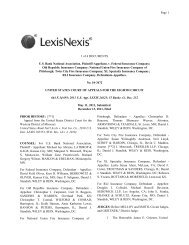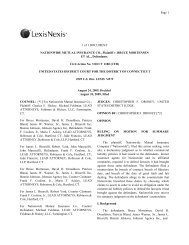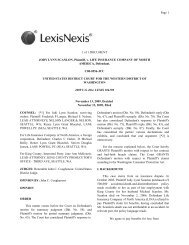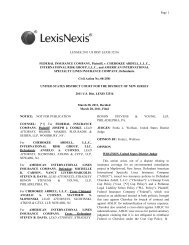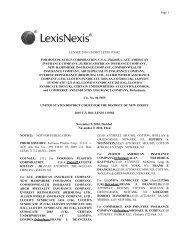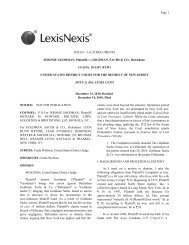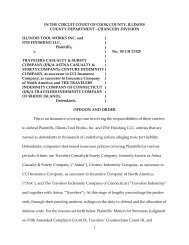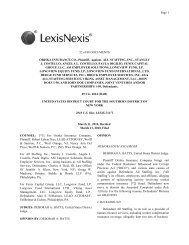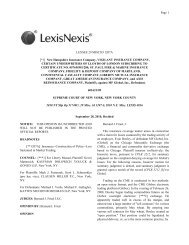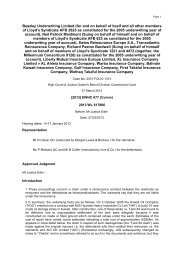Call v. Czaplicki - The Insurance & Reinsurance Report
Call v. Czaplicki - The Insurance & Reinsurance Report
Call v. Czaplicki - The Insurance & Reinsurance Report
Create successful ePaper yourself
Turn your PDF publications into a flip-book with our unique Google optimized e-Paper software.
Page 11 of 2 DOCUMENTSGREGORY W. CALL, KATHLEEN CALL, Plaintiffs, v. DANIEL A. CZAPLICKI,ESQUIRE, DANIEL A. CZAPLICKI & ASSOCIATES, P.C., BERNARD J.AUDETTE, KEITH McGUIRE, THE CREATIVE FINANCIAL GROUP, NEWENGLAND SECURITIES CORP., NEW ENGLAND FINANCIAL, NEWENGLAND LIFE INSURANCE CO., JOHN DOES 1-10, and ABCCORPORATIONS 1-10, Defendants.Civil No. 09-6561 (RBK/AMD)UNITED STATES DISTRICT COURT FOR THE DISTRICT OF NEW JERSEY2010 U.S. Dist. LEXIS 97268September 16, 2010, DecidedSeptember 16, 2010, FiledNOTICE:NOT FOR PUBLICATIONMCCARTER & ENGLISH, LLP, NEWARK, NJ.PRIOR HISTORY: <strong>Call</strong> v. <strong>Czaplicki</strong>, 2010 U.S. Dist.LEXIS 75916 (D.N.J., July 28, 2010)COUNSEL: [*1] For GREGORY W. CALL,KATHLEEN CALL, Plaintiffs: BRENDAN J.KAVANAGH, LEAD ATTORNEY, KAVANAGH,KAVANAGH & DILAZZERO, LLC, MILLVILLE, NJ;JEFFREY A. DILAZZERO, KARANAGHKAVANAGH & DILAZZERO LLC, MILLVILLE, NJ.For DANIEL A. CZAPLICKI, ESQUIRE, DANIEL A.CZAPLICKI & ASSOCIATES, P.C., Defendants:CANDIDUS K. DOUGHERTY, JEFFREY B.MCCARRON, SWARTZ, CAMPBELL LLC,PHILADELPHIA, PA.For BERNARD J. AUDET, KEITH MCGUIRE, NEWENGLAND SECURITIES CORP., NEW ENGLANDLIFE INSURANCE COMPANY, Defendants: B. JOHNPENDLETON, JR., MCCARTER & ENGLISH, LLP,NEWARK, NJ.For NEW ENGLAND FINANCIAL, Defendant: B.JOHN PENDLETON, JR., LEAD ATTORNEY,JUDGES: ROBERT B. KUGLER, United States DistrictJudge.OPINION BY: ROBERT B. KUGLEROPINIONKUGLER, United States District Judge:This matter arises out of alleged legal malpracticeduring the formation of a business agreement and fraudduring the formation of a life insurance contract.Presently before the Court is the Motion to Dismiss byDefendants New England Securities Corporation, NewEngland Financial, New England Life <strong>Insurance</strong>Company (collectively, "New England"), and Bernard J.Audette (Doc. No. 7). For the reasons discussed below,the Motion is granted [*2] in part and denied in part.I. BACKGROUNDPlaintiffs Gregory W. <strong>Call</strong> and Kathleen <strong>Call</strong> arehusband and wife. Defendant Daniel A. <strong>Czaplicki</strong> is anattorney licensed to practice law in the Commonwealth of
2010 U.S. Dist. LEXIS 97268, *2Page 2Pennsylvania and the State of Delaware. DefendantDaniel A. <strong>Czaplicki</strong> & Associates, P.C. is a Pennsylvaniaprofessional corporation and Mr. <strong>Czaplicki</strong>'s employer.<strong>The</strong> remaining Defendants are interrelated. For example,Defendant Creative Financial Group ("Creative") is aPennsylvania partnership engaged in the business ofselling life insurance, stocks, bonds, mutual funds,financial products, and financial services. Bernard J.Audette was an employee and/or agent of the CreativeFinancial Group, as was Keith McGuire. In turn, Creativewas the agent of Defendant New England. <strong>The</strong>seDefendants' involvement in the present dispute is asfollows.Plaintiff Gregory <strong>Call</strong> and nonparties Brian Horneand Rex D. Mouser were shareholders and owners ofMart, Inc., a Delaware corporation, Casie Protank, Inc., aNew Jersey corporation, and Rezultz, Inc., another NewJersey corporation. Gregory <strong>Call</strong> was the majorityshareholder/owner of each of these entities. In June of2003, <strong>Call</strong>, Horne, and Mouser consulted [*3] withAudette and Creative regarding the purchase of lifeinsurance policies and other financial products that wouldprovide for three things: (1) the buy-out of theirrespective interests in the three businesses upon theirdeaths; (2) the establishment of life insurance trusts thatwould have the effect of avoiding the payment of anyunnecessary taxes by their respective estates; and (3) theestablishment of a retirement plan that would allow <strong>Call</strong>,Horne, and Mouser to avoid the payment of unnecessarytaxes with their retirement savings and income.Around the same time, Audette and Creative advisedGregory <strong>Call</strong> that there were pending changes to the IRSCode that would eliminate certain tax shelters that werethen available to <strong>Call</strong>, his business partners, and theirbusinesses. Audette and the Creative Financial Groupfurther advised that to take advantage of these taxshelters, it was necessary to immediately form aDelaware limited liability partnership. Thus, Audette andCreative referred <strong>Call</strong> to the <strong>Czaplicki</strong> Defendants for thepurpose of obtaining legal advice regarding the formationand administration of these tax shelters.<strong>Call</strong> then met with Daniel <strong>Czaplicki</strong> in June 2003.<strong>Czaplicki</strong> [*4] advised <strong>Call</strong> that it would be necessary toprepare a shareholders' agreement and a partnershipagreement to facilitate the formation and administrationof the desired tax shelters. On June 10, 2003, <strong>Call</strong>, Horne,and Mouser executed a shareholder agreement and aseparate partnership agreement between Mart, Inc., CasieProtank, Inc., and Rezultz, Inc. for the formation ofOceanfront Leasing, LLP, a Delaware limited liabilitypartnership. At the same time that <strong>Czaplicki</strong> wasrepresenting Gregory <strong>Call</strong> with regard to the twoagreements, he also represented Horne, Mouser, CasieProtank, Mart, and Rezultz, despite what <strong>Call</strong> allegeswere actual adverse interests of the parties.Gregory <strong>Call</strong> alleges that <strong>Czaplicki</strong>'s legal adviceand work was faulty on several fronts, including failing toprepare and perform with the requisite standard of care,failing to advise of the conflict of interest, and failing toadvise that he was not licensed to practice in New Jersey.Plaintiffs claim that as a result of the <strong>Czaplicki</strong>'snegligent representation, Horne was able to use theshareholders' agreement to block and/or attempt to blockthe sale of Casie Protank, Mart, and Rezultz, despite hisbeing only a ten [*5] percent owner of each of thosecorporations. With that power, Plaintiffs allege thatHorne was able to demand a larger portion of the salesprice of those entities than he would have otherwise beenentitled to. Plaintiffs further allege that because of<strong>Czaplicki</strong>'s faulty legal advice, Gregory <strong>Call</strong> lost theability to utilize a tax loss carry forward in theapproximate amount of $8,600,000.00.Plaintiffs also allege that they were injured byvarious acts of the remaining Defendants. First, Plaintiffsallege that as part of the "Wealth Advisory Services"provided by Audette, McGuire, Creative, and NewEngland, Gregory <strong>Call</strong> was referred to the <strong>Czaplicki</strong>Defendants. Plaintiffs allege that all Defendants werenegligent in failing to, among other things, investigate<strong>Czaplicki</strong>'s qualifications and credentials and failing toreveal Defendants' precise relationship with each other.Second, Plaintiffs allege that all Defendants breached animplied oral contract between the parties wherebyDefendants would fund a $4,000,000.00 life insurancepolicy for Plaintiffs through the investment incomegenerated by a life insurance trust fund. Plaintiffs allegethat Defendants represented that one lump [*6] sumpayment of $100,000.00 to the life insurance trust wassufficient to pay the premium payments for the lifeinsurance policy. Third, Plaintiffs allege that Defendantsbreached the implied warranty of fitness for a particularpurpose by procuring a life insurance policy that failed tomeet Plaintiffs' specific insurance needs. Fourth,Plaintiffs allege that Defendants violated the New JerseyConsumer Fraud Act ("NJCFA") 1 by fraudulently
2010 U.S. Dist. LEXIS 97268, *6Page 3inducing Plaintiffs to purchase a $4,000,000.00 lifeinsurance policy. Fifth, Plaintiffs allege that Defendantscommitted common law fraud by representing toPlaintiffs that the $100,000.00 front-loaded paymentwould generate enough income to enable Plaintiffs tomake the premium payments on the life insurance policy.Plaintiffs also allege that Defendants used $21,409.14 ofthe premiums paid by another client on a separate lifeinsurance policy to pay the premiums on Plaintiffs' lifeinsurance policy.1 N.J. Stat. Ann. §§ 56:8-1 to 56:8-184 (West2000).On June 10, 2009, Plaintiffs filed a complaint in theSuperior Court of New Jersey for Gloucester County.Subsequently on November 4, 2009, Plaintiffs filed theFirst Amended Complaint, which contains [*7] sevencounts: (1) legal malpractice, (2) breach of fiduciary duty,(3) negligence, (4) breach of contract, (5) breach ofwarranty, (6) violation of the New Jersey ConsumerFraud Act, and (7) fraud. Only Counts One and Two areagainst the <strong>Czaplicki</strong> Defendants, while Counts Threethrough Seven are against the remaining Defendants.All Defendants removed the civil action to this Courton December 31, 2009. Defendants Audette and NewEngland moved to dismiss on January 20, 2010. Allparties have now briefed the Motion and it is ripe forreview.II. STANDARDUnder Federal Rule of Civil Procedure 12(b)(6), acourt may dismiss an action for failure to state a claimupon which relief can be granted. With a motion todismiss, "'courts accept all factual allegations as true,construe the complaint in the light most favorable to theplaintiff, and determine whether, under any reasonablereading of the complaint, the plaintiff may be entitled torelief.'" Fowler v. UPMC Shadyside, 578 F.3d 203, 210(3d Cir. 2009) (quoting Phillips v. County of Allegheny,515 F.3d 224, 233 (3d Cir. 2008)). In other words, acomplaint survives a motion to dismiss if it containssufficient factual matter, accepted as [*8] true, to "state aclaim to relief that is plausible on its face." Bell AtlanticCorp. v. Twombly, 550 U.S. 544, 570, 127 S. Ct. 1955,167 L. Ed. 2d 929 (2007).In making this determination, a court must engage ina two-part analysis. Ashcroft v. Iqbal, 129 S. Ct. 1937,1949-50, 173 L. Ed. 2d 868 (2009); Fowler, 578 F.3d at210-11. First, the court must separate factual allegationsfrom legal conclusions. Iqbal, 129 S. Ct. at 1949."Threadbare recitals of the elements of a cause of action,supported by mere conclusory statements, do not suffice."Id. Second, the court must determine whether the factualallegations are sufficient to show that the plaintiff has a"plausible claim for relief." Id. at 1950. Determiningplausibility is a "context-specific task" that requires thecourt to "draw on its judicial experience and commonsense." Id. A complaint cannot survive where a court canonly infer that a claim is merely possible rather thanplausible. See id.III. DISCUSSIONDefendants seek relief on several substantive fronts.<strong>The</strong>y argue that (1) Plaintiffs fail to state a claim underthe NJCFA because the Act does not apply to the sale ofsecurities, and a variable life insurance policy is a"security"; (2) Defendant Audette is exempt from liability[*9] under the NJCFA because the Act does not apply tolicensed insurance brokers; (3) there is no legal supportfor the proposition that a plaintiff may bring a negligenceaction against a licensed insurance broker for thenegligent recommendation of a lawyer, and policyconsiderations do not compel this court to recognize acause of action for negligent recommendation; (4)Plaintiffs fail to state a claim for breach of an oralcontract because evidence of an oral contract is barred bythe parole evidence rule and New Jersey courts do notrecognize a cause of action for breach of contract for thenegligent procurement of insurance by an insuranceagent; (5) Plaintiffs fail to state a claim for breach ofwarranty because a life insurance policy is not a "good"under Article II of the Uniform Commercial Code; and(6) Plaintiffs failed to plead fraud under the common lawand the NJCFA with particularity because Plaintiffsfailed to state which defendants made fraudulentmisrepresentations.A. <strong>The</strong> New Jersey Consumer Fraud Act<strong>The</strong> first issue before this Court is whether theNJCFA is capacious enough to govern the sale of avariable life insurance policy. A variable life insurancepolicy is [*10] comprised of both an investmentcomponent and an insurance component. <strong>The</strong> hybridnature of this insurance instrument gives rise to thisdispute because the NJCFA governs the sale of insurance,but does not govern the sale of securities. Defendants
2010 U.S. Dist. LEXIS 97268, *10Page 4argue that because a variable life insurance policy is asecurity, and the New Jersey Supreme Court has held thatthe NJCFA does not cover the sale of securities, Plaintiffsfail to state a claim. (Def. Reply Br. in Further Supp. of<strong>The</strong>ir Mot. to Dismiss Pl.'s First Am. Com. 2.) In supportof this argument, Defendants offer a host of federal caseswhich stand for the proposition that a variable lifeinsurance policy is a security, 2 and a ruling by the U.S.Securities and Exchange Commission ("SEC"). 3 Inresponse, Plaintiffs argue that (1) insurance policies are"merchandise" under the NJCFA; (2) no New Jerseycourt has held that insurance is a security; (2) under NewJersey law insurance is not a security 4 ; and 3) the plainlanguage of the policy expressly states that the policy isan insurance contract and not a variable life insurancepolicy. Additionally, Plaintiffs argue that even if the courtfinds that the disputed life insurance policy [*11] doesnot fall within the ambit of the NJCFA, Defendantsprovided Plaintiff with "estate planning and wealthadvisory services," and these services fall within thescope of the NJCFA.2 Defendants point to Roth v. Am. Family Mut.Ins. Co., 567 F.3d 884, 886 (7th Cir. 2009)(finding that variable universal life insurancepolicies are "both securities and insurancecontracts") and Araujo v. John Hancock Life Ins.Co., 206 F. Supp. 2d 377, 381-82 (E.D.N.Y. 2002)(holding that a variable life insurance policy "is a'security' because it invests in mutual funds whichare regulated by the SEC . . ." and because ". . .plaintiff invested his premiums in a sub-accountwhich is registered with the SEC under theInvestment Company Act of 1940."), to supporttheir argument that a life insurance policy is asecurity.3 Securities Act Release No. 33-5360 Fed. Sec.L. Rep. [1973 Decisions] * 4 ("[T]he Commissionhas determined that a variable life contract wouldbe a security.").4 In support of their position, Defendants offerthe Uniform Securities Law, N.J.S.A. 49:3-49(m)(West 2005) ("[T]he term '[s]ecurity' does notinclude any insurance [ ] policy or annuitycontract under which an insurance company[*12] promises to pay a fixed or variable numberof dollars either in a lump sum or periodically forlife or some other specified period.").1. Variable Life <strong>Insurance</strong> Policies Under the NJCFABefore analyzing whether the life insurance policy atissue in this dispute is a security, it is important to notethat no New Jersey court has determined whether avariable life insurance policy is a security under NewJersey law. Thus, as the Third Circuit Court of Appealsheld in Pennsylvania Glass Sand Corp. v. CaterpillarTractor Co., "[i]n the absence of an authoritativepronouncement from the state's highest court, the task ofa federal tribunal is to predict how that court would rule .. . . <strong>The</strong> policies underlying the applicable legal doctrines,the doctrinal trends indicated by these policies, and thedecisions of other courts may also inform our analysis. Inaddition, we may consult treatises, the Restatement, andthe works of scholarly commentators." 652 F.2d 1165,1167 (3d Cir. 1981) (citations omitted) overruled onother grounds by Aloe Co. v. Clark Equipment Co., 816F.2d 110 (3d Cir. 1987).<strong>The</strong> court's goal when interpreting a statute is toascertain the legislature's intent. Lee v. First Union Natl.Bank, 199 N.J. 251, 971 A.2d 1054, 1059 (N.J. 2009).[*13] <strong>The</strong> first step in this analysis is to examine "thelanguage of the statute, seeking further guidance only tothe extent that the Legislature's intent cannot be derivedfrom the words that it has chosen." Id. (quoting Pizzullov. N.J. Mfrs. Ins. Co., 196 N.J. 251, 952 A.2d 1077, 1084(N.J. 2008)). Generally, "technical terms, terms of art,and terms with existing legal meanings 'in the absence oflegislative intent to the contrary, or other overridingevidence of a different meaning' are understood to havebeen used in accordance with those meanings." In reLead Paint Litig., 191 N.J. 405, 924 A.2d 484, 499 (2007)(quoting 2A Norman J. Singer, Sutherland StatutoryConstruction §§ 47:29, 47:30 (6th ed. 2000)). Wheninterpreting ordinary, nontechnical terms, "a court shallgive the language, selected by the Legislature, its plainmeaning." Lee, 971 A.2d at 1059. Importantly, the Courtshould "avoid a literal interpretation of individualstatutory terms or provisions that would be inconsistentwith the overall purpose of the statute." Id. (quoting StateFarm Mut. Auto. Ins. Co. v. Licensed Beverage Ins.Exch., 146 N.J. 1, 679 A.2d 620, 622 (N.J. 2007)). Whenstatutory language is unclear, or amenable to more thanone interpretation, [*14] "the court will look to othersources to determine the Legislature's intent." Id.<strong>The</strong> NJCFA provides in relevant part:<strong>The</strong> act, use or employment by anyperson of any unconscionable commercial
2010 U.S. Dist. LEXIS 97268, *14Page 5practice, deception, fraud, false pretense,false promise, misrepresentation, or theknowing, concealment, suppression, oromission of any material fact with intentthat others rely upon such concealment,suppression or omission, in connectionwith the sale or advertisement of anymerchandise or real estate, or with thesubsequent performance of such person asaforesaid, whether or not any person has infact been misled, deceived or damagedthereby, is declared to be an unlawfulpractice . . . ."N.J. Stat. Ann. § 56:8-2 (West 2002) (emphasisadded).In 1960, the New Jersey legislature enacted theNJCFA to "'eliminat[e] sharp practices and dealings inthe marketing of merchandise and real estate.'" Lee, 971A.2d at 1058 (quoting Channel Cos. v. Britton, 167 N.J.Super. 417, 400 A.2d 1221 (N.J. Super. Ct. App. Div.1979)). In order to effectuate its purpose, the Actprovides "a remedy for any consumer who has sufferedan 'ascertainable loss of moneys or property, real orpersonal, as a result of [a CFA violation],' including[*15] treble damages, costs, and attorneys fees." Id.Importantly, New Jersey courts have construed the statute"liberally, in favor of consumers." Cox. v. Sears Roebuck& Co., 138 N.J. 2, 647 A.2d 454, 461 (1994).Furthermore, the "scope of the CFA's proscriptions areboth wide and deep," and New Jersey courts have appliedits provisions in "varied and eclectic" contexts. Real v.Radir Wheels, Inc., 198 N.J. 511, 969 A.2d 1069, 1076(N.J. 2009). However, despite its broad reach, the NJCFAis inapplicable in contexts where "a conflict would existsif the CFA were to apply to a particular practice." Id. at1076 (quoting Lemelledo v. Beneficial Mgmt. Corp. ofAm., 150 N.J. 255, 696 A.2d 546, 552-53 (1997).Put simply, Defendants argue that because a variablelife insurance policy is a security under federal law, it isalso a security under New Jersey law, and thereforeexempt from the NJCFA. (Def. Reply Br. in FurtherSupp. of <strong>The</strong>ir Mot. To Dismiss Pl. First. Am. Compl. 2.)In response, Plaintiffs offer the definition of a "security"provided by the New Jersey Uniform Securities Law,which provides that the term "'[s]ecurity' does not includeany insurance or endowment policy or annuity contractunder which an insurance company promises [*16] topay a fixed or variable number of dollars either in lumpsum or periodically for life or some other specifiedperiod." N.J. Stat. Ann. § 49:3-49(m) (West 2005)(emphasis added).Defendants rely on Lee v. First Union NationalBank, to support their argument that "the CFA was notmeant to reach the sale of securities . . . ." 199 N.J. 251,971 A.2d 1054, 1061 (N.J. 2009). In Lee, the Courtreasoned that the statute did not govern the sale ofsecurities because the legislative history revealed that theterms "real estate" and "securities" were initially includedin the statute, but the Legislature later removed the terms,and subsequently reinserted "real estate" into the statute.Id. at 1060-61. <strong>The</strong> Court concluded that this intentionalomission demonstrated that the Legislature intended toexclude "securities" from the reach of the statute. Id. at1060. Defendants also offer a ruling from the SEC, whichprovides that "the Commission has determined that avariable life contract [is] a security." (Def.'s Reply Br. inFurther Supp. of <strong>The</strong>ir Mot. to Dismiss Pl.'s First Am.Compl. 2) (citing Securities Act Release No. 33-5360Fed. Sec. L. Rep. [1973 Decisions] *4). Finally,Defendants rely upon a variety [*17] of federal caseswhich stand for the same proposition. See id. at 3 (citingBazzone v. Nationwide Mut., 123 Fed. Appx. 503 (3rdCir. 2005)); Herndon v. Equitable Variable Life Ins. Co.,325 F.3d 1252, 1255 (11th Cir. 2003) (per curiam);Brashears v. 1717 Capital Mgmt., 2004 U.S. Dist. LEXIS28400 (D. Del. May 21, 2004); Araujo v. John HancockLife Ins. Co., 206 F. Supp. 2d 377, 381-82 (E.D.N.Y.2002); In re Lutheran Bhd. Variable Ins. Prods. Co. SalesPractices Litig., 105 F. Supp. 2d 1037, 1040 (D. Minn.2000); Lasley v. New England Variable Life Ins. Co., 126F. Supp. 2d 1236, 1239 (N.D. Cal. 1999).Defendants reliance upon Lee is misplaced. AlthoughLee stands for the proposition that the NJCFA does notapply to "securities" generally, there is no indication thatthe Court intended to exclude an instrument consisting ofboth a life insurance component and an investmentcomponent from the NJCFA. Hence, Lee is easilydistinguishable from this case because the defendants inLee sold the plaintiff a traditional mutual fund and not avariable life insurance policy.Defendants' attempt to apply the SEC's definition ofa variable life insurance policy to the NJCFA's definitionof "security" is also unpersuasive [*18] for the following
2010 U.S. Dist. LEXIS 97268, *18Page 6reasons. First, while Defendants offer ample support fortheir argument that a variable life insurance policy is asecurity under federal law, Defendants offer no legalsupport for the argument that designating an insurancepolicy as a "security" under federal securities lawnecessarily precludes regulation of the same policy as aninsurance contract under state law. Plaintiffs do not denythat a variable life insurance policy is a security underfederal law; rather they argue that because a variable lifeinsurance policy is an insurance contract under the lawsof New Jersey, it is subject to the NJCFA. (Pl. Br. inOpp'n to Mot. to Dismiss Filed by Def. 8.) In Sec. andExch. Comm'n v. United Benefit Life Ins. Co., theSupreme Court separated the investment and insurancecomponents of a variable annuity contract that containedelements of both an investment account and an insurancepolicy to determine whether a variable annuityconstituted an "investment contract" under the SecuritiesAct. 387 U.S. 202, 87 S. Ct. 1557, 18 L. Ed. 2d 673(1967). In United, the defendants sold the plaintiff adeferred annuity plan that consisted of both a investmentcomponent (the "Flexible Fund") and an insurancecomponent. [*19] Id. at 210. <strong>The</strong> investment componentof the plan was designed to "appeal to the purchaser noton the usual insurance basis of stability and security buton the prospect of 'growth' through sound investmentmanagement." Id. at 211. <strong>The</strong> Court held that the variableannuity constituted a "security" under the Securities Actand that the investment component of the contract did not"fall within the insurance exception of § 3(a) of theSecurities Act." Id. at 210-11. Significantly, the Courtnoted that the "basic difference between a contract towhich some degree is insured and a contract of insurancemust be recognized." Id. In reaching its decision, theCourt bifurcated its analysis of the characteristics of avariable annuity. First, the Court described what itreferred to as the "accumulation period." During thisperiod, the "insurer promises to serve as an investmentagency and allow the policyholder to share in itsinvestment experience." Id. at 208. <strong>The</strong> Court thendistinguished the accumulation period from the periodwhere the insurance company must determine "whatamount of annuity payment is to be allowed for eachdollar paid into the annuity fund at maturity." Id. <strong>The</strong>Court determined [*20] that during this period, "theinsurer is acting, in a role similar to that of a savingsinstitution, and state regulation is adjusted to this role.<strong>The</strong> policyholder has no direct interest in the fund and theinsurer has a dollar target to meet." Id. at 207 (emphasisadded). Thus, the Court effectively treated the annuitycontract as an investment security during theaccumulation period and an insurance product during thematurity period.Variable life insurance policies, such as the policy inUnited, share many of the same characteristics as variableannuity contracts. 5 Both contracts contain an investmentaccount that fluctuates in value based upon theperformance of securities in an account portfolio, and theperformance of an account manager. Additionally, bothaccounts require the insurer to pay the insured a fixedsum at the time the policy matures or when thepolicyholder deceases. Furthermore, both plans shift therisk allocation between the insured and the insurer.During the investment phase of the plan, the plan holderbears a majority of the risk that the plan will substantiallydecrease in value based on fluctuations in the market.During this phase, the investor depends [*21] upon theinvestment experience and expertise of the investmentfund manager. By contrast, during the maturity or payoutphase of the plan, the insurer bears the risk because itmust pay the insured the amount of money promisedunder the terms of the plan. In light of the inherentsimilarities between variable annuity contracts andvariable life insurance policies, it is plausible that a statemay bifurcate the investment and insurance componentsof a variable life insurance policy and subject one to theNJCFA and the other to the state or federal securitieslaws. <strong>The</strong>refore applying the framework adopted by theSupreme Court in United 6 to the facts of this case, wewill separate the insurance component of Plaintiffs lifeinsurance contract from the investment component for thepurposes of applying the NJCFA.5 Indeed, the SEC has discussed both variablelife insurance and variable annuities under theumbrella of "variable products" in the context ofhow their characteristics are relevant to theconcerns underlying securities regulation. Seegenerally Office of Compliance Inspections andExamination, U.S. Sec. and Exch. Comm'n &Nat'l Ass'n of Sec. Dealers, Joint SEC/NASD<strong>Report</strong> on Examination [*22] Findings RegardingBroker-Dealer Sales of Variable <strong>Insurance</strong>Products (2004).6 See also John Hancock Mut. Life Ins. Co. v.Harris Trust & Sav. Bank, 510 U.S. 86, 101-104,114 S.Ct. 517, 527-28, 126 L. Ed. 2d 524 (1993)(applying the same analysis used in United tobifurcate a life insurance contract into an
2010 U.S. Dist. LEXIS 97268, *22Page 7investment component and a life insurancecomponent in order to determine "whether thefiduciary standards stated in EmployeeRetirement Income Security Act of 1974 (ERISA)govern an insurance company's conduct inrelation to certain annuity contracts.").<strong>The</strong> federal cases Defendants use to support theirdefinition of a "variable life insurance policy" are alsodistinguishable from this case. <strong>The</strong> first set of casesDefendants cite involve parties bringing either federalcauses of action with supplemental state law claims, orsolely federal causes of action under the PrivateSecurities Litigation Reform Act of 1995 ("PSLRA") orthe Securities Litigation Uniform Standards Act of 1998("SLUSA"). See Herndon v. Equitable Variable Life Ins.Co., 325 F.3d 1252, 1253-54 (11th Cir. 2003) (upholdingthe district court's decision that "a variable life insurancepolicy is a 'covered security' under the [SLUSA].");[*23] In re Lutheran Bhd. Variable Ins. Prods. Co. SalesPractices Litig., 105 F. Supp. 2d 1037, 1040 (D. Minn.2007) (dismissing the plaintiff's state law claims in aclass action suit brought under the SLUSA); Lasley v.New England Variable Life Ins. Co., 126 F. Supp. 2d1236, 1239 (N.D. Cal. 1999) (same); Araujo v. JohnHancock Life Ins. Co., 206 F. Supp. 2d 377 (E.D.N.Y.2002) (same); and Brashears v. 1717 Capital Mgmt.,2004 WL 1196896, at 1-2 (D. Del. May 21, 2004)(adjudicating claims brought under the PSLRA). 7Congress enacted the SLUSA after the PSLRAspecifically to prevent plaintiffs from bringing classaction securities cases in state court rather than federalcourt, see H.R. Conf. Rep. No. 105-803, at 13 (1998)("<strong>The</strong> purpose of this title is to prevent plaintiffs fromseeking to evade the protections that Federal law providesagainst abusive litigation by filing suit in State, ratherthan in Federal court."), and the SLUSA expresslyprecludes plaintiffs from bringing supplemental state lawclaims in federal court. 15 U.S.C. § 78bb(f) ("No coveredclass action based upon the statutory or common law ofany State or subdivision thereof may be maintained inany State or Federal court by any private [*24] party . . .."). Because both SLUSA and PSLRA were designedspecifically to prevent plaintiffs from evading federalregulation of securities by bringing claims in state court,the cases Defendants offer under SLUSA and PSLRA donot resolve a dispute concerning the proper interpretationof a state consumer fraud statute.7 This Court notes that Defendants also citeBazzone v. Nationwide Mut., 123 Fed. Appx. 503(3d Cir. 2005), in support of their argument thatthe Third Circuit has recognized the SEC'sdetermination that variable life insurance policiesare securities. However, Defendant neglects tomention that the only statement supportingDefendants' argument is a brief quote by JudgeAmbro in the dissenting opinion. <strong>The</strong> majorityopinion provides no support for the propositionthat a variable life insurance policy is a securityunder federal law. Moreover, Defendants offer noprecedential authority in the Third Circuit for thisproposition.In the second set of cases, the federal courts werecalled upon to determine exclusively whether a variablelife insurance policy is a "security" for the purpose ofinterpreting the Securities Act of 1933. 8 However,variable life insurance policies [*25] are hybrid productsconsisting of both insurance and investment components.Because this case implicates the insurance component ofa hybrid product, the classification of a variable lifeinsurance policy as a "security" (under federal law) doesnot necessarily defeat the state's ability to regulate thenonsecurity, insurance component in state court. <strong>The</strong>rationale for SEC regulation of securities is to ensure thedisclosure of information about speculative investments,not mere promises to pay. See SEC v. Southwest Coal &Energy Co., 624 F.2d 1312, 1318 (5th Cir. 1980) ("<strong>The</strong>federal securities laws were enacted primarily to servetwo distinct goals: 1) to promote or require sufficientdisclosure of information to allow those in securitiesmarkets to make intelligent investment decisions, and 2)to control fraud and manipulation in the trading ofsecurities."); Sec. and Exch. Comm'n v. Guild Films Co.,279 F.2d 485 (2d Cir. 1960) ("<strong>The</strong> Securities Act of 1933was primarily intended to 'protect investors by requiringregistration with the Commission of certain informationconcerning securities offered for sale.'" (quoting Gilligan,Will & Co. v. S.E.C., 267 F.2d 461, 463 (2d Cir. 1959)).[*26] <strong>The</strong>refore, the federal cases Defendants offer insupport of their contention that variable life insurancepolicies are securities and therefore exempt from theNJCFA do not dictate the outcome of this dispute.8 15 U.S.C. § 77a-aa (West 1980).In light of the foregoing considerations, this Courtwill construe the term "variable life insurance policy"against the backdrop of New Jersey's strong consumer
2010 U.S. Dist. LEXIS 97268, *26Page 8protection policies. As the New Jersey Supreme Courtstated in Cox v. Sears Roebuck & Co., "the Act should beconstrued liberally in favor of consumers." 138 N.J. 2,647 A.2d 454, 461 (N.J. 1994). Furthermore, the purposeof the Act is to protect consumers "by eliminating thesharp practices and dealing in the marketing ofmerchandise." Channel Co., Inc. v. Britton, 167 N.J.Super. 417, 400 A.2d 1221 (N.J. Super. A.D. 1979). Asthe New Jersey Supreme Court noted in Lemelledo, "theCFA could not possibly enumerate all, or even most, ofthe areas and practices that it covers without severelyretarding its broad remedial power to root out fraud in itsmyriad, nefarious manifestations." Lemelledo, 696 A.2dat 551. <strong>The</strong>refore, based on the plain text and purpose ofthe NJCFA, this Court concludes that the Act is broadenough [*27] to include the sale of the variable lifeinsurance policy that is the subject of this dispute.Although the Act excludes "securities," it covers"insurance policies." <strong>The</strong> type of hybrid productDefendants marketed to Plaintiffs contained elements ofboth an insurance contract and a security. While state andfederal securities laws protect consumers from certainpractices in the marketing of securities, they do notnecessarily extend to the insurance component of avariable life insurance policy. So in the spirit of theNJCFA and to ensure that consumer protections extend toall components of a variable life insurance product, thisCourt finds that the Act governs the variable lifeinsurance policy Defendants sold to Plaintiffs.2. <strong>Insurance</strong> Broker Liability Under the NJCFAAfter determining that a variable life insurancepolicy may constitute an insurance contract under NewJersey law, this Court must decide whether a partybringing an action under the NJCFA may bring a cause ofaction against an insurance broker for the sale of lifeinsurance. Defendants argue that Plaintiffs fail to state aclaim under the NJCFA because insurance brokers areexempt from the NJCFA under the "learned [*28]professionals exception." 9 (Def. Brief in Supp. of <strong>The</strong>irMot. to Dismiss Pl. First Am. Compl. 11.) Defendantsalso note, and this Court agrees, that at the time of thetransaction, Defendant Audette was a licensed lifeinsurance agent in the State of New Jersey and thereforenot subject to the provisions of the NJCFA. Plaintiffsallege that Defendants argument fails because DefendantAudette was acting outside of the scope of hisemployment as an insurance broker. (Pl. Br. in Opp'n toMot. to Dismiss Filed By Def. 11.) In particular, theAmended Complaint alleges that Defendant Audette wasacting outside of the scope of his license when heprovided Plaintiffs with "Wealth Advisory Services."(Am. Compl. at 53.)9 For support, Defendants cite Macedo v. DelloRusso, 178 N.J. 340, 840 A.2d 238, 242 (N.J.2004), in which the New Jersey Supreme Courtstated, "[w]e therefore must assume that theLegislature approves of the consistent judicialinterpretation of the CFA that has been extant forfour decades. Under that interpretation,advertisements by learned professionals in respectof the rendering of professional services areinsulated from the CFA but subject tocomprehensive regulation by the relevant [*29]regulatory bodies and to any common-lawremedies that otherwise apply."In Plemmons v. Blue Chip Ins. Serv., Inc., the NewJersey Supreme Court held that "insurance brokers are'semi-professional[s]' who are excluded from liabilityunder the CFA for the services they render within thescope of their professional licenses." 387 N.J. Super. 551,904 A.2d 825, 833-34 (2006). <strong>The</strong> allegations in theAmended Complaint belie Plaintiffs argument thatDefendant Audette was offering more than life insuranceservices. Counts Four through Seven of the Complaintrelate specifically to Defendant Audette's sale of aninvestment trust to fund the premiums on a life insurancepolicy. Because Plaintiffs' NJCFA claims relate toDefendant Audette's work as an insurance broker, andlicensed insurance brokers are exempt from theprovisions of the NJCFA, Plaintiffs fail to state a claimagainst Defendant Audette, upon which relief may begranted.<strong>The</strong> "learned professionals" exemption applies onlyto insurance brokers and not insurance companies.Defendants do not argue that Defendant New England isa licensed insurance broker in the State of New Jersey.Thus, the rationales for the Court's decision in Plemmonsdo not apply to [*30] the sale of an insurance policy byan insurance company or a merchant who is not alicensed insurance broker. In Plemmons, the Courtanalogized insurance brokers to real estate brokers whoare exempt from the provisions of the NJCFA because, aslicensed semi-professionals, they are "subject to testing,licensing, regulations and penalties through otherlegislative provisions," and because "the nature of [a real
2010 U.S. Dist. LEXIS 97268, *30Page 9estate broker's] activity is recognized as somethingbeyond the ordinary commercial seller of goods orservices-an activity beyond the pale of the [NJCFA]."904 A.2d at 831 (quoting Neveroski v. Blair, 141 N.J.Super. 365, 358 A.2d 473, 480-81 (N.J. Super. A.D.1976)). Furthermore, in Plemmons, the Court expresslystated that "it is clear under Lemelledo that financialinstitutions and insurance companies that sell insurancepolicies 'as goods and services that are marketed toconsumers' are subject to the CFA." Id. at 833 (citingLemelledo, 696 A.2d at 551). <strong>The</strong>refore, becauseinsurance companies and unlicensed insurance brokersare not subject to the same licensing and registrationmechanisms as insurance brokers, this Court finds thatDefendants' motion to dismiss based on Plaintiffs'NJCFA claims [*31] against New England is denied.B. NegligencePlaintiffs also fail to state a claim for negligence. Inshort, Plaintiffs allege that this Court should recognize aclaim against Defendants for negligently referringPlaintiffs to Defendants Daniel <strong>Czaplicki</strong> and <strong>Czaplicki</strong>& Associates, P.C. without conducting a reasonableinvestigation of Defendant <strong>Czaplicki</strong>'s legal credentials.Although Plaintiffs concede that Defendant Audette hadno duty to refer Plaintiffs to an attorney, they argue thatonce Defendants assumed the duty of referring Plaintiffsto an attorney, they assumed the concomitant duty torefer Plaintiffs to an attorney with the skills andcredentials necessary to diligently conduct therepresentation.In order to plead a cause of action for negligence, aplaintiff must show (1) duty; (2) breach; (3) proximatecause; and (4) damages. Polozo v. County of Essex, 196N.J. 569, 960 A.2d 375, 384 (N.J. 2008). In order todetermine whether an alleged tortfeasor is liable fornegligence, this Court must first determine whetherDefendants owed a duty of care to Plaintiffs. <strong>The</strong>determination of whether a duty of care exists is"quintessentially a question of law for the court."Highlands Ins. Co. v. Hobbs Grp, LLC, 373 F.3d 347,351 (3d Cir. 2004). [*32] Foreseeability and fairness aretwo key concepts a court should apply to determinewhether a duty exists. Highlands, 373 F.3d at 352 (citingCarter Lincoln-Mercury, Inc., Leasing Div. v. EMARGrp, Inc., 135 N.J. 182, 638 A.2d 1288 (N.J. 1994)). <strong>The</strong>concept of foreseeability "takes into account therelationship between the plaintiff and the broker, thenature of the risk and the defendant's ability andopportunity to exercise care and avert harm." CarterLincoln-Mercury, 638 A.2d at 1294. <strong>The</strong> element offairness "requires a court to make a value judgment as towhether establishing a broker's duty in relationship to aparticular plaintiff is fair based on policy considerationsand the public interest." Id.In this case, both Plaintiffs and Defendants agree thatan insurance broker has no duty to refer a client to anattorney for legal services. Furthermore, it is clear thatreferring legal services is outside of the scope of aninsurance agent's duty to assist a client in procuringadequate insurance. However, Plaintiffs argue thatbecause Defendant Audette offered to refer Defendant<strong>Czaplicki</strong>'s legal services, he assumed a commensurateresponsibility to conduct a reasonable investigation of<strong>Czaplicki</strong>'s [*33] qualifications. This Court declines toaccept Plaintiffs' invitation to create a duty of reasonableinvestigation for an insurance agent who refers a client toan attorney for the following reasons.Applying the concepts articulated in Carter to thiscase, it is certainly foreseeable that a negligentrecommendation on the part of Defendants would resultin economic harm to Plaintiffs. <strong>The</strong> nature of this riskwas certainly foreseeable and understandable byDefendant Audette before he referred Plaintiffs toDefendant <strong>Czaplicki</strong>. However, there is no evidence thatDefendant Audette had the ability and opportunity toexercise reasonable care. Although Defendant Audetteprovided "Wealth Advisory Services," he was licensedand qualified to perform services as an insurance broker.<strong>The</strong>refore, the foreseeability analysis does not supportimposing liability for negligent representation.This Court also finds that considerations of fairnessand public policy weigh against imposing liability oninsurance brokers for the negligent referral of legalservices. While insurance brokers owe a duty to performa reasonable investigation of an insurance carrier beforeplacing an insured's policy with the [*34] carrier, CarterLincoln-Mercury, 638 A.2d at 1297, there is little reasonto impose the same liability on insurance agents forreferring clients to attorneys. Though insurance agentsmay understand the relevant characteristics of acompetent insurance agent, there is little reason to believethat an insurance agent will know how to assess thequalifications of a competent attorney, or will conduct theresearch necessary to acquire this knowledge. While the
2010 U.S. Dist. LEXIS 97268, *34Page 10Court notes that Defendant Audette also performed"Wealth Advisory Services," Plaintiffs fail to allege thatwealth advisory involves the practice of law or anyknowledge of the law. Furthermore, the imposition of aduty of reasonable investigation is wholly unnecessaryhere as Plaintiffs may bring a cause of action for breachof a fiduciary duty against Defendant Audette, or,Plaintiffs may recover directly from Defendants Daniel<strong>Czaplicki</strong> and <strong>Czaplicki</strong> & Associates, P.C.Even assuming arguendo that this Court recognizes alegal duty to conduct a reasonable investigation, Plaintiffsfail to state a claim. Plaintiffs entire negligence claimrests on allegations that Defendant Audette (1) failed toadequately investigate Defendant [*35] Daniel<strong>Czaplicki</strong>'s credentials; (2) failed to adequatelyinvestigate whether Defendant <strong>Czaplicki</strong> had an adequateamount of legal malpractice insurance; and (3) failed todisclose the nature of his precise relationship withDefendant <strong>Czaplicki</strong> and the "influence" Defendants hadover <strong>Czaplicki</strong>. (First Am. Compl. 13). However,Plaintiffs fail to allege that Defendant <strong>Czaplicki</strong>'sknowledge of New Jersey law (or lack thereof) causedany of Plaintiffs' losses, or that Defendant <strong>Czaplicki</strong>'slack of legal malpractice insurance caused any ofPlaintiffs' losses. Thus, even if this Court recognizes acause of action for negligent referral of an attorney by aninsurance broker, Plaintiffs fail to state a claim uponwhich relief may be granted.C. Breach of Contract 1010 Because Plaintiffs brought claims for breachof contract, common law fraud, and negligence,this Court notes that under New Jersey law, theeconomic loss doctrine bars a party fromsimultaneously recovering for the economiclosses caused by breach of contract and commonlaw fraud or negligence. See Alloway v. Gen.Marine Indus., L.P., 149 N.J. 620, 695 A.2d 264(N.J. 1997). However, neither party argues thatthe economic loss doctrine applies to [*36] thiscase, and it is unnecessary for the Court to addressthe economic loss doctrine to resolve this dispute.Plaintiffs allege that Defendants breached an impliedoral contract whereby Defendants would procure a$4,000,000.00 policy, and use a front-loaded payment of$100,000.00 to create an investment trust that would earnsufficient income interest to pay the premiums on the lifeinsurance policy. Defendants argue that (1) Plaintiffs didnot breach any term of the written life insurance policy;(2) any oral agreement between the parties is barred bythe parole evidence rule; and (3) New Jersey does notrecognize an oral contract for the procurement of lifeinsurance.In order to state a claim for breach of contract inNew Jersey, a plaintiff must allege "1) a contract; 2) []breach of that contract; 3) damages flowing therefrom;and 4) that the [plaintiff] performed its own contractualobligations." See Video Pipeline, Inc. v. Buena VistaHome Entm't, Inc., 210 F. Supp. 2d 552, 561 (D.N.J.2002). Unfortunately for Plaintiffs, it is well-settled thatNew Jersey does not recognize a breach of contract claimfor the negligent procurement of life insurance. CarterLincoln-Mercury, Inc., Leasing Div. v. EMAR Grp, Inc.,135 N.J. 182, 638 A.2d 1288, 1291 (N.J. 1994); [*37]Rider v. Lynch, 42 N.J. 465, 201 A.2d 561, 567 (N.J.1964). When a client depends upon an insurance brokerto procure insurance that best suits his needs, "[t]he termsof the contract to procure the insurance, the scope of therisk and subject matter to be covered, may be found byimplication." Rider, 201 A.2d at 567. However, "[t]heprincipal does not sue on a contract of insurance; he seeksrecovery for the loss occasioned by the failure to procuresuch a contract or such a valid contract." Id.In this case, the gravamen of Plaintiffs' breach ofcontract claim is that Defendants failed to "properlyinvest plaintiff[']s front-loaded premium in the amount of$100,000.00 as was originally bargained for andpromised." (First Am. Compl. 78.) Although Plaintiffsalso allege that Defendants "charg[ed] excessive feeswhich prevented the plaintiff's Life <strong>Insurance</strong> Policy fromgenerating sufficient income to fund the regularpremiums as they became due and owing," and"misappl[ied] premiums that had been paid by CasieProtank, Inc., Mart, Inc., and/or Resultz, Inc. andappl[ied] [the premiums] toward the Life <strong>Insurance</strong>Policy purchased by the plaintiffs," the basis of Plaintiff'sclaim is that Defendants [*38] simply failed to generateenough income from the investment trust to pay thepremiums on Plaintiff's life insurance policy. Id.Because New Jersey does not recognize a breach ofcontract claim for conduct that constitutes the negligentprocurement of life insurance, and Plaintiffs fail to allegethat Defendants breached any provision of the written lifeinsurance policy, Plaintiffs fail to state a claim for breachof contract.
2010 U.S. Dist. LEXIS 97268, *38Page 11D. Breach of the Implied Warranty of Fitness for aParticular PurposeThis Court also rejects Plaintiffs' strained claim thatDefendants breached the implied warranty of fitness for aparticular purpose. Plaintiffs allege that Defendants "didnot form the life insurance trust that they hadrecommended to the plaintiffs at the time [Defendants]sold the Life <strong>Insurance</strong> Policy in question to theplaintiffs." (First Am. Compl. 88.) Plaintiffs' also arguethat Defendants failed to procure a life insurance policythat met the specific purposes they communicated toDefendants.<strong>The</strong> implied warranty of fitness for a particularpurpose applies to the sale of "goods" under Article II ofthe Uniform Commercial Code ("U.C.C."), as adopted byNew Jersey and enacted at N.J. Stat. Ann. §§ 12A:1-101to 12-26 [*39] (2010). <strong>The</strong> Uniform Commercial Codeprovides that "'[g]oods' means all things . . . which aremovable at the time of identification to the contract forsale other than the money in which the price is to be paid,investment securities (Chapter 8) and things in action.'Goods' also includes the unborn young of animals andgrowing crops and other identified things attached torealty as described in the section on goods to be severedfrom realty (12A:2-107)." N.J. Stat. Ann. § 12A:2-105.No New Jersey court has decided whether an insurancecontract is a "good" under the definition of "goods"provided in section 2-105 of the U.C.C. However, nearlyall jurisdictions that have construed the U.C.C. have heldthat the term "goods" does not include insurancecontracts. 11 In the absence of any New Jersey case lawaddressing this issue, this Court declines to expand thedefinition of "goods" under the U.C.C. by creating a newcause of action under the implied warranty of fitness for aparticular purpose for insurance contracts. Furthermore,Plaintiffs provide no authority supporting their argumentthat an insurance contract is a "good" under Article 2 ofthe U.C.C. Accordingly, this Court finds [*40] thatPlaintiffs fail to state a claim for breach of an impliedwarranty of fitness for a particular purpose.11 See Howard v. CitiFinancial, Inc., 195 F.Supp. 2d 811, 826 (S.D. Miss. 2002); Bartley v.Nat'l Union Fire Ins. Co., 824 F. Supp. 624, 636(N.D. Tex. 1992); Elrad v. United Life AccidentIns. Co., 624 F. Supp. 742, 744 (N.D. Ill. 1985);Klapp v. United Ins. Grp. Agency, 259 Mich. App.467, 674 N.W.2d 736, 738 (Mich. App. 2003);Jones v. CGU Ins. Co., 78 S.W.3d 626, 629 (Tex.App. 2002); Nielsen v. United Servs. Auto. Ass'n,244 Ill. App. 3d 658, 612 N.E.2d 526, 531, 183 Ill.Dec. 874 (Ill. App. Ct. 1993). See also White &Summers, Uniform Commercial Code (2d Ed.1980) at 6 ("<strong>The</strong> Code does not apply to theformation, performance, and enforcement ofinsurance contracts . . . .").E. Common Law FraudDefendants challenge Plaintiffs' common law fraudclaim on several fronts, but in essence argue thatPlaintiffs failed to allege justifiable reliance because thelife insurance contract contained all of the material termsof the agreement between the parties, and, that Plaintiffsfailed to plead fraud with the requisite specificity -including a precise statement of the date, time, or place ofthe fraud, or the allegations that apply to each defendant.[*41] (Def. Reply Br. in Further Supp. of <strong>The</strong>ir Mot. toDismiss Pl.'s First Am. Compl. 13.) In response,Plaintiffs allege that they have pled a claim becauseDefendants misrepresented that the $100,000.00front-loaded payment would cover the cost of theinsurance premiums; that Defendants used Plaintiffs'front-loaded premium for their own use and benefit anddeliberately concealed the fact that they had not investedthe front-loaded premium appropriately; and thatDefendants misapplied $21,409.14 of the premiums paidto an insurance policy created for Mart, Inc., CasieProtank, Inc., and Rezultz, Inc. to pay Plaintiffs' lifeinsurance policy premiums.<strong>The</strong> elements of common law fraud are (1) a materialmisrepresentation of a presently existing or past fact, (2)knowledge or belief by the defendant of its falsity, (3)intent that the other party rely on it, (4) reasonablereliance by the other party, and (5) resulting damages.Triffin v. Automatic Data Processing, Inc., 394 N.J.Super. 237, 926 A.2d 362, 368 (N.J. Super. Ct. App. Div.2007). A plaintiff must plead common law fraud withparticularity under Federal Rule of Civil Procedure 9(b).Frederico v. Home Depot, 507 F.3d 188, 200 (3d Cir.2007). Thus, [*42] a party claiming fraud must "plead orallege the date, time, and place of the alleged fraud orotherwise inject precision or some measure ofsubstantiation into a fraud allegation." Id.A party bringing a common law fraud claim mustshow that their reliance on the defendant'smisrepresentations was reasonable. In re Resorts Int'l,
2010 U.S. Dist. LEXIS 97268, *42Page 12Inc., 181 F.3d 505, 509 (3d Cir. 1999). Reliance isunreasonable when the party to a life insurance contractrelies upon statements that contradict the written policyitself. See In re Northwestern Mut. Life Ins. Co. SalesPractices Litig., 70 F. Supp. 2d 466, 486 (D.N.J. 1999)("[T]he general rule in New Jersey has been that aninsured is under a duty to examine his insurance policies;if the terms disclosed by such an examination areinconsistent with his desires, he is required to notify thecompany of the inconsistency and of his refusal to acceptthe policy in the proffered condition.") (quoting Martinezv. John Hancock Mut. Life Ins. Co., 145 N.J. Super. 301,367 A.2d 904, 909 (App. Div. 1976)). In New Jersey "onewho sues an insurance company in fraud and deceit forthe acts of its agent, and who could have protectedhimself by an examination of the policy, is under an[*43] obligation to do so." National Premium BudgetPlan Corp. v. National Fire Ins. Co., 97 N.J. Super. 149,234 A.2d 683, 716 (N.J. Super. Ct. Law Div. 1967), aff'd,106 N.J. Super. 238, 254 A.2d 819 (N.J. Super. Ct. App.Div. 1969).In this case, Plaintiffs deposited a $100,000.00front-loaded premium from a Merrill Lynch account intoan investment fund to be used to pay the premiums on alife insurance policy. Plaintiffs allege that Defendantsrepresented to them that the income generated by aninvestment fund bearing the front-loaded payment of$100,000.00 was sufficient to pay the premiums on a$4,000,000.00 life insurance policy without anyadditional payments. However, the express terms of thewritten life insurance policy contradict Plaintiffs'interpretation of the policy. In particular, the agreementprovides 12 :Planned Annual Premium1st Year $100,000.00Year 2 $100,000.00No Lapse Annual Premium $30,743.77.(Certification of B. John Pendleton, Jr.,in Supp. of Def. Mot. to Dismiss Ex. B at3.)Furthermore, the policy provides that "[t]he valuesand benefits of a policy depend on: the investmentperformance of the portfolios in which the SubAccountsare invested; and the interest credited to the FixedAccount. We do not [*44] guarantee the investmentperformance of the portfolios of the SubAccounts. Youbear the investment risk for amounts invested in theSubAccounts for your Policy." In light of the clearlanguage of the policy, Plaintiffs' claim that theyjustifiably relied upon Defendants' representations thatthe investment trust would generate enough income topay the policy premiums, and that the $100,000.00front-loaded premium would be sufficient to pay thepremiums on the policy, fails as a matter of law. 1312 <strong>The</strong> general rule is that a trial court "hasdiscretion to address evidence outside thecomplaint when ruling on a motion to dismiss."Pryor v. Nat'l Collegiate Athletic Ass'n, 288 F.3d548 (2002). As the Third Circuit acknowledged inPryor, the court may consider "documents whosecontents are alleged in the complaint and whoseauthenticity no party questions, but which are notphysically attached to the pleading." Id. at 560.Furthermore, a court may also consider"[d]ocuments that the defendant attaches to themotion to dismiss . . . if they are referred to in theplaintiff's complaint and are central to the claim . .. ." Id. Because both parties refer to, and relyupon, the life insurance [*45] policy, and thepolicy is integral to the fair resolution of thisdispute, this Court will examine the terms of thepolicy to determine whether to grant Defendants'motion to dismiss.13 <strong>The</strong> Court notes that Plaintiff submitted anaffidavit by Plaintiff Gregory W. <strong>Call</strong> with theirBrief in Opposition to Motion to Dismiss Filed byDefendants. <strong>The</strong> contents of Plaintiffs' affidavitsuggest that Plaintiffs did not receive a copy ofthe life insurance policy until after theytransferred $100,000.00 from the Merrill Lynchaccount into the investment trust. Pursuant to Rule
2010 U.S. Dist. LEXIS 97268, *45Page 1312(b)(6), this Court will not consider the factscontained in the affidavit that are not included inthe Complaint or Amended Complaint. As thecourt held in Poling v. K. Hovnanian Enters., 99F. Supp. 2d 502 (D.N.J. 2000), "[i]n evaluating aRule 12(b)(6) motion to dismiss for failure to statea claim, a court may consider only the complaint,exhibits attached to the complaint, matters ofpublic record, and undisputedly authenticdocuments if the plaintiff's claims are based uponthose documents." (citing Pension Benefit Guar.Corp. v. White Consol. Indus., 998 F.2d 1192 (3dCir. 1993), cert. denied, 510 U.S. 1042, 114 S. Ct.687, 126 L. Ed. 2d 655 (1994)). [*46]Accordingly, Plaintiff may not insert facts that arenot alleged in the Amended Complaint, byattaching an affidavit to a brief filed in oppositionto Defendants' motion to dismiss.Because Plaintiffs' claim that Defendants' allegedmisrepresentation that the front-loaded premium wouldcover the cost of life insurance premium payments failsas a matter of law, Plaintiffs' only remaining fraud claimsare that Defendants misappropriated Plaintiffs'front-loaded premium "for their own personal benefit anduse," and "misapplied $21,409.14 of the premiums beingpaid by Casie Protank, Inc., Mart, Inc., and/or Resultz,Inc. on an entirely separate life insurance policy . . .toward the premiums that were due . . . on the Life<strong>Insurance</strong> Policy purchased by the plaintiffs . . . ." (Am.Compl. at 104, 106.)Stripped to their bare form, the allegations in theAmended Complaint suggest that Defendants engaged insome form of unlawful conduct by transferring fundsfrom one of Plaintiffs' accounts to their life insurancepolicy without providing them with proper notice, andused Plaintiffs' front-loaded premium for Defendants'own personal benefit. However, Plaintiffs do not allege(1) that Defendants [*47] knew or had reason to knowthat they would use funds from the premiums paid byCasie Protank, Mart, and Rezultz on another lifeinsurance policy to pay the premiums on Plaintiffs' lifeinsurance policy; (2) reasonable reliance by Plaintiffsprior to signing the life insurance policy; (3) thatDefendants intented to induce Plaintiffs to rely on themisrepresentation; and/or (4) damages. Plaintiffs merelyallege that Defendants misused and misappropriatedfunds from three companies controlled by PlaintiffGregory <strong>Call</strong> to pay Plaintiffs' life insurance policy sothat it would not lapse. While Plaintiffs may have acognizable claim against Defendant Audette for breach ofa fiduciary duty, Plaintiffs fail to state a claim of commonlaw fraud. <strong>The</strong>refore, although Plaintiffs havedemonstrated that Defendants abused the privilege oftheir position and control over Plaintiffs' insurance needs,Plaintiffs have failed to allege a cognizable cause ofaction for fraud.F. Fraud Under the New Jersey Consumer Fraud Act<strong>The</strong> Court must reach the same result as to Plaintiffs'claim under the NJCFA. To state a claim under theNJCFA, a plaintiff must show (1) unlawful conduct bythe defendants; (2) an ascertainable [*48] loss on the partof the plaintiff; and (3) a causal relationship between theunlawful conduct and the ascertainable loss. DeutscheBank Nat. Trust Co. v. Lacapria, No. 08-2174, 2010 U.S.Dist. LEXIS 17998, 2010 WL 715617, at *5 (D.N.J. Mar.1, 2010). Because Plaintiffs have failed to state a claimfor fraud, they have also failed to state a claim under theNJCFA. Cf. Int'l Minerals & Mining Corp. v. Citicorp N.Am., Inc., 736 F.Supp. 587, 599 (D.N.J. 1990) (holdingthat NJCFA claim failed where underlying common lawfraud claim failed). <strong>The</strong>refore, the Court grantsDefendants' Motion to Dismiss as to Plaintiffs claim offraud under the NJCFA.IV. CONCLUSIONFor the foregoing reasons, the Court will grantDefendants' motion to dismiss with respect to CountsFour, Five, Six, and Seven of the Amended Complaint;deny Defendants' motion to dismiss with respect toDefendant New England on Count Three; and grantDefendant Audette's motion to dismiss on Count Three.<strong>The</strong> accompanying Order shall issue today.Dated: 9/16/2010/s/ Robert B. KuglerROBERT B. KUGLERUnited States District Judge


